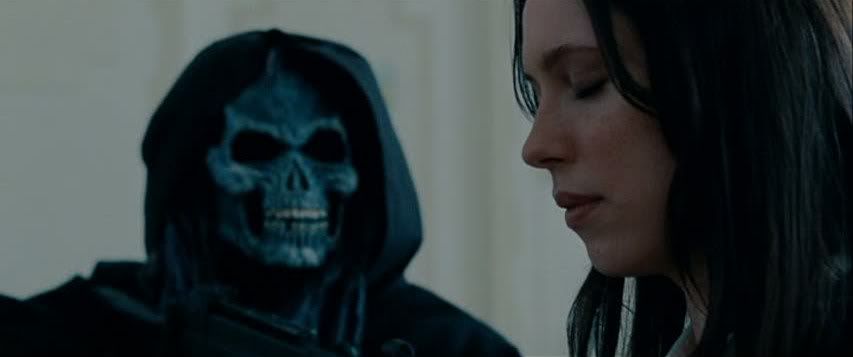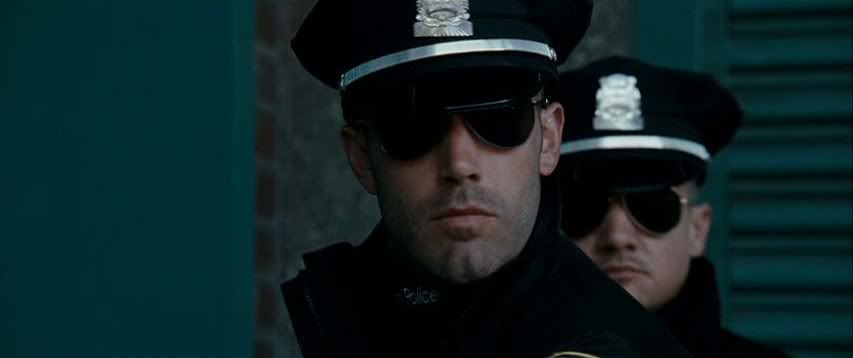
Ben Affleck really likes Michael Mann's Heat. Like, really, really loves it. Like, it's his favorite movie ever. How do I know this? Because Affleck's second directorial feature, The Town, follows the template of Heat so closely, is so deeply indebted to its example in every way, that it might as well be a remake. Affleck plays Doug MacRay, the brains behind a gang of Boston bank robbers who run briskly paced jobs that could be mistaken for professional robberies if you ignore all the idiotic things that the script has these supposed crack thieves do over the course of the film. Heat was driven by the grudging professional respect and mutual intelligence of Robert De Niro's ace thief and Al Pacino's dogged police detective, so Affleck tries to develop a similar rivalry/bond between MacRay and the FBI agent trying to catch him, Adam Frawley (Jon Hamm). In some ways this is doomed to failure — Affleck and Hamm is simply not De Niro and Pacino, and there's nothing anyone can do about that — but the problems run deeper than that. Affleck can't develop the same epic but intimate scale that Mann so effortlessly infuses into his films, where the canvas might be sprawling but the characters within it are sharply defined. The characters of The Town lack that definition, and the relationships between them are consequently shallow. When Frawley half-admiringly calls his adversaries "the not-fucking-around crew" — after an armored car robbery that went so spectacularly, laughably wrong that the crooks ultimately escape only because the script says they must — it doesn't feel earned, it doesn't feel organic.
That's the case with a lot of things here. The Town isn't as deep or as smart as it clearly thinks it is, but it does have its charms. Affleck has a good feel for action, and his robbery scenes have energy and vigor to spare. Taken as a lightweight heist flick — its obvious cribbing from Heat aside — it's at least mildly enjoyable, and does a good job of conveying the hopeless cycle of these poor Boston guys who seem to have crime passed down to them in their blood from their equally lowlife fathers. As the Irish gangster Fergie (Pete Postlethwaite) tells MacRay's gang at one point, he looks at them and sees their fathers; he's an old guy who's been in this racket long enough to see gangs of sons replace their fathers. That's probably the film's most compelling subtext, this emphasis on the continuity of crime from one generation to the next within this cramped part of Boston that no one ever really gets out of.
Less compelling is the budding romance between MacRay and the bank manager, Claire (Rebecca Hall), who his gang had briefly taken hostage during the robbery that opens the film. Affleck seems to be going for the unlikely but surprisingly tender romance between De Niro and Amy Brenneman in Heat, but Mann developed those characters so that they were disarmingly right together. The romance in The Town just consistently feels unlikely and silly, despite a warm and nuanced performance from Hall as her character deals with the stress of the bank robbery's fallout. The drama is, in general, rather generic, just stock bits of childhood trauma that provide the characters an opportunity for ponderous soul-baring speeches. MacRay's mother left him when he was a kid, and Claire had a brother who died when she was young, though this bit of information then becomes merely a source for the clever catch phrase that Claire uses to alert MacRay to the feds' presence in her apartment when Affleck decides to rip off the farewell scene between Val Kilmer and Ashley Judd in, you guessed it, Heat.

That's not all he rips off. The film frequently feels like a collection of scenes and scenarios from Mann's heist classic. The final robbery, at Boston's Fenway Park, degenerates into a street battle between cops and crooks, with assault rifles blaring. In the midst of this chaos, the final run of MacRay's best friend James (Jeremy Renner, giving an edgy, slightly sinister performance that deepens the character far more than the script does) feels more than a little like a recreation of the final moments of Tom Sizemore's character in Heat. In the film's final act, MacRay even develops a thirst for vengeance that drives him much as De Niro's Neil McCauley in Heat.
But this is precisely where the biggest difference between The Town and its source arises. It's obvious, from his film's denouement, that Affleck is more of a romantic than Mann. Virtually no one could watch the final act of Heat without desperately hoping that Neil makes it out alive, that's he's able to evade capture and find his private paradise with the woman he loves, away from the life of violence and crime he'd made for himself. And virtually no one could watch the final act of Heat without knowing that Neil is doomed anyway, that his mythical "one last gig" will not be his last because he's gone into hiding on some tropical island. Neil is such a compelling character, as defined by Mann and De Niro, that one always wants to see him make it, even knowing he won't, and even despite everything's he done in his life. Affleck obviously watches Heat with that same yearning for Neil's success, and this is doubtless why he decided to give his own film a kind of happy ending for his own character — as though he could vicariously live out the escape and rebirth denied to Neil. Neil's desire for vengeance undid him, but MacRay is able to get his vengeance, he's able to get his escape, he's able to get his redemption by using his stolen money for good, he's even implicitly able to get his girl, who may come join him in his exile someday. Affleck is ducking away from darkness and complexity, delivering a would-be heartwarming ending in which the longtime crook redeems himself and gets away clean. It's singularly unsatisfying, and not only because of the cheesy sunset shot of a bearded MacRay looking out over a lake from his remote cabin.
What's obvious is that Affleck wanted to remake Heat without dealing with the complicated morality or deep, contradictory characters of Mann's film. The Town still has its moments, like the way James takes a sip of soda from a discarded fast food drink before making his suicidal final run at the cops: the kind of small, surprising, humanizing detail that is sorely needed in this film. The performances are largely solid, particularly Renner's James, who has an at times creepy bond with his childhood friend, and Postlethwaite as the kind of sinister, subtly nasty hood who might have fit well in one of Guy Ritchie's first couple of films. The only real exception is Blake Lively, as James' sister Krista, delivering a mumbling, over-the-top performance of such spectacular awfulness that her big dramatic moments induce only giggles. The problem with the film is not the cast, however, but the generic unoriginality of its script and the lack of anything substantial or un-borrowed to flesh out these clichés.









0Awesome Comments!